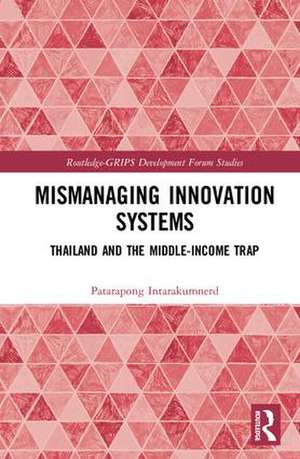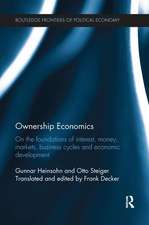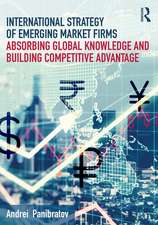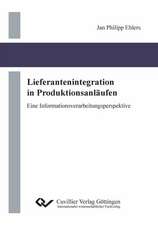Mismanaging Innovation Systems: Thailand and the Middle-income Trap: Routledge-GRIPS Development Forum Studies
Autor Patarapong Intarakumnerden Limba Engleză Hardback – 28 sep 2017
Including comparative analyses with other Asian nations, this book is a must-read for both students and practitioners with interests in development economics, industrial economics and public policy.
| Toate formatele și edițiile | Preț | Express |
|---|---|---|
| Paperback (1) | 389.38 lei 6-8 săpt. | |
| Taylor & Francis – 26 sep 2019 | 389.38 lei 6-8 săpt. | |
| Hardback (1) | 762.01 lei 6-8 săpt. | |
| Taylor & Francis – 28 sep 2017 | 762.01 lei 6-8 săpt. |
Din seria Routledge-GRIPS Development Forum Studies
-
 Preț: 318.62 lei
Preț: 318.62 lei -
 Preț: 413.37 lei
Preț: 413.37 lei -
 Preț: 287.07 lei
Preț: 287.07 lei -
 Preț: 389.38 lei
Preț: 389.38 lei - 5%
 Preț: 370.11 lei
Preț: 370.11 lei -
 Preț: 389.66 lei
Preț: 389.66 lei
Preț: 762.01 lei
Preț vechi: 1026.13 lei
-26% Nou
Puncte Express: 1143
Preț estimativ în valută:
145.81€ • 152.65$ • 120.65£
145.81€ • 152.65$ • 120.65£
Carte tipărită la comandă
Livrare economică 05-19 aprilie
Preluare comenzi: 021 569.72.76
Specificații
ISBN-13: 9781138124820
ISBN-10: 1138124826
Pagini: 128
Ilustrații: 11 Tables, black and white
Dimensiuni: 156 x 234 x 13 mm
Greutate: 0.33 kg
Ediția:1
Editura: Taylor & Francis
Colecția Routledge
Seria Routledge-GRIPS Development Forum Studies
Locul publicării:Oxford, United Kingdom
ISBN-10: 1138124826
Pagini: 128
Ilustrații: 11 Tables, black and white
Dimensiuni: 156 x 234 x 13 mm
Greutate: 0.33 kg
Ediția:1
Editura: Taylor & Francis
Colecția Routledge
Seria Routledge-GRIPS Development Forum Studies
Locul publicării:Oxford, United Kingdom
Public țintă
Postgraduate and UndergraduateCuprins
1. Introduction Part I: Thailand’s National Innovation System: Performance of Key Actors 2. Science, Technology and Innovation Policy of the Thai Government 3. Technological Learning and Innovation of Firms in Thailand 4. Universities and Public Research Institutes 5. Innovation Financing 6. Institutions Part II: Sectoral Innovation Systems of Strategic Industries 7. Thai Electronic Industry 8. Thai Automotive Industry 9. Thai Seafood Industry
Notă biografică
Patarapong Intarakumnerd is Professor at the National Graduate Institute for Policy Studies (GRIPS) in Tokyo, Japan. He is a regional editor and member of international editorial boards of several international journals relating to innovation management and policies. He has worked as an advisor/consultant for the World Bank, UNESCO, UNCTAD, OECD, Japan International Cooperation Agency (JICA), German Development Institute, International Development Research Center of Canada, and Economic Research Institute of ASEAN and East Asia (ERIA).
Recenzii
'Mismanaging Innovation Systems: Thailand and the Middle-income Trap by Patarapong Intarakumnerd looks at the problems of innovation systems of Thailand, and their contributions to the failure to emerge from the middle-income trap. It makes comparison with other more successful countries like those of East Asia (Japan, Korea and Taiwan) and Singapore. It draws lessons from misdirected or incomplete measures taken by successive governments in the past twenty years to stimulate the innovation systems successfully so as to launch the country in the path away from the middle-income trap. The diagnosis and solutions suggested are well worth serious consideration by those involved in trying to solve the problems, although like a moderate student in the classroom, more comparison with other moderate students like Malaysia, Vietnam, Philippines and Indonesia would also help in improving future performance. The student would also be encouraged by examples of past actions, albeit only a few, which were in the "right" directions.' — Yongyuth Yuthavong, Former Deputy Prime Minister and Minister of Science and Technology, Thailand
'Mismanaging Innovation Systems is an important, timely and provocative volume. There is much debate about the meaning and origins of the so-called ‘middle income trap’. But what is clear in the case of Thailand is that the country’s earlier economic dynamism has waned, and that a new economic model is needed to regain that dynamism. Skills and innovation will be central to this new development strategy. Policy makers and academics in Thailand and other middle-income developing countries will benefit greatly from a close study of Dr Patarapong’s pioneering analysis.' — Professor Hal Hill, Australian National University
'This is an important subject and a timely book. Thailand’s economy, once pictured as a tiger, is now said to be caught in a trap. Where is the failure located—in the education system, in government policy-making, or in how firms behave? Patarapong Intarakumnerd looks at the problem, not from the old angle of "economic development" but rather "innovations systems". He examines how government, education institutions, firms, and others work together. He shows that there have been some successful cases, but they are too limited in extent. This fascinating and practical book shows a way to set the tiger free again.' — Pasuk Phongpaichit, Professor, Faculty of Economics, Chulalongkorn University
'In 2016, the Prayut administration decided to introduce a new national strategy of "Thailand 4.0" to overcome the problem of the middle-income trap which Thailand has suffered for the past decade. "Thailand 4.0" comprises of a variety of ideas such as the rehabilitation of the Eastern Seaboard Industrial Development (now Eastern Economic Corridor or EEC), the development of digital economy, and the promotion of next-generation industries like robotics and smart electronics. Keywords in "Thailand 4.0" are value-based economy, creativity, and innovation. The new national strategy invites people to turn their eyes towards historical questions of how the Thai government has designed science and technology policy at the macro level and how foreign and local firms have promoted innovative works at the micro level. Intarakumnerd’s book is a comprehensive academic work to fully answer these important questions. This book includes: the overview of the government policies relating to national innovation system; evaluation of the roles and capabilities of key players such as firms, public research institutions, universities and industrial associations; and in-depth empirical studies of innovative works in three major sectors including electronics, automotive and seafood industries. This book is very valuable for students and policy makers who are interested in the trajectory and prospects of newly emerging Asian economies.' — Akira Suehiro, Professor and Dean, Faculty of International Social Sciences, Gakushuin University, and Professor Emeritus, University of Tokyo
'Mismanaging Innovation Systems is an important, timely and provocative volume. There is much debate about the meaning and origins of the so-called ‘middle income trap’. But what is clear in the case of Thailand is that the country’s earlier economic dynamism has waned, and that a new economic model is needed to regain that dynamism. Skills and innovation will be central to this new development strategy. Policy makers and academics in Thailand and other middle-income developing countries will benefit greatly from a close study of Dr Patarapong’s pioneering analysis.' — Professor Hal Hill, Australian National University
'This is an important subject and a timely book. Thailand’s economy, once pictured as a tiger, is now said to be caught in a trap. Where is the failure located—in the education system, in government policy-making, or in how firms behave? Patarapong Intarakumnerd looks at the problem, not from the old angle of "economic development" but rather "innovations systems". He examines how government, education institutions, firms, and others work together. He shows that there have been some successful cases, but they are too limited in extent. This fascinating and practical book shows a way to set the tiger free again.' — Pasuk Phongpaichit, Professor, Faculty of Economics, Chulalongkorn University
'In 2016, the Prayut administration decided to introduce a new national strategy of "Thailand 4.0" to overcome the problem of the middle-income trap which Thailand has suffered for the past decade. "Thailand 4.0" comprises of a variety of ideas such as the rehabilitation of the Eastern Seaboard Industrial Development (now Eastern Economic Corridor or EEC), the development of digital economy, and the promotion of next-generation industries like robotics and smart electronics. Keywords in "Thailand 4.0" are value-based economy, creativity, and innovation. The new national strategy invites people to turn their eyes towards historical questions of how the Thai government has designed science and technology policy at the macro level and how foreign and local firms have promoted innovative works at the micro level. Intarakumnerd’s book is a comprehensive academic work to fully answer these important questions. This book includes: the overview of the government policies relating to national innovation system; evaluation of the roles and capabilities of key players such as firms, public research institutions, universities and industrial associations; and in-depth empirical studies of innovative works in three major sectors including electronics, automotive and seafood industries. This book is very valuable for students and policy makers who are interested in the trajectory and prospects of newly emerging Asian economies.' — Akira Suehiro, Professor and Dean, Faculty of International Social Sciences, Gakushuin University, and Professor Emeritus, University of Tokyo
Descriere
Once recognised as a high-performing Asian newly industrialising economy, Thailand’s growth rate and competitive edge have declined substantially. With slower adoption and movement towards the knowledge –intensive industry, the loss of competitive edge has caused concerns among Thai policy makers, with Thailand succumbing to the middle-income trap. This book analyses Thailand’s declining competitiveness in the past 50 years, taking into consideration both national- and sectoral-level roles and capabilities of key players — a must-read for both students and practitioners with interest in development economics, industrial economics and public policy.













